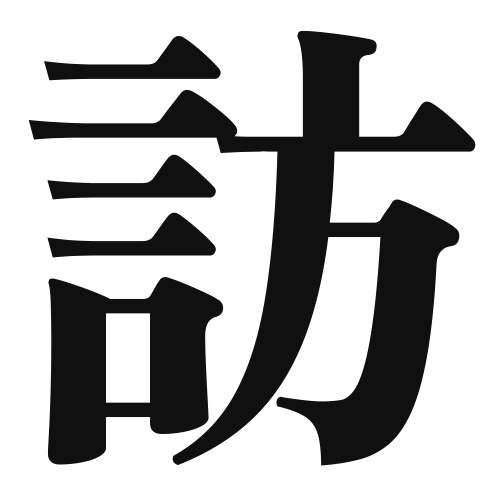1. Overview of Meaning
The kanji “訪” (pronounced “hō” or “otozureru”) means “to visit” or “to call on someone.” It conveys the action of going to see someone or a place, often with the intention of socializing or checking in.
2. Formation and Radical
Formation of the Kanji: The kanji “訪” is a compound character that combines elements to convey its meaning. It consists of the radical “言” (speech) and the phonetic component “方” (direction), suggesting the act of speaking or communicating in a certain direction or to a certain person.
Radical: The radical of “訪” is “言” (gen), which relates to speech or language, emphasizing the communicative aspect of visiting.
3. Examples of Usage
Common Words and Phrases: Some frequently used words that include “訪” are:
- 訪問 (ほうもん, hōmon) – visit
- 訪れる (おとずれる, otozureru) – to visit
Example Sentences in Daily Conversation:
- 友達の家を訪れました。 (ともだちのいえをおとずれました。) – I visited my friend’s house.
- 先生が学校に訪問しました。 (せんせいががっこうにほうもんしました。) – The teacher visited the school.
4. Synonyms and Antonyms
Similar Kanji: A kanji with a similar meaning is “来” (らい, rai), which means “to come.” While “訪” emphasizes the act of visiting someone, “来” focuses on the action of coming to a place.
Opposite Kanji: An antonym for “訪” is “去” (きょ, kyo), which means “to leave” or “to depart,” indicating the opposite action of visiting.
5. Cultural and Historical Background
Relation to Japanese Culture: In Japanese culture, visiting friends and family is an important social practice, often associated with hospitality and maintaining relationships. The act of visiting is deeply rooted in cultural traditions.
Proverbs and Idioms: One common saying is “訪問は心の贈り物” (ほうもんはこころのおくりもの), which translates to “A visit is a gift from the heart,” highlighting the value of personal visits in expressing care and connection.
